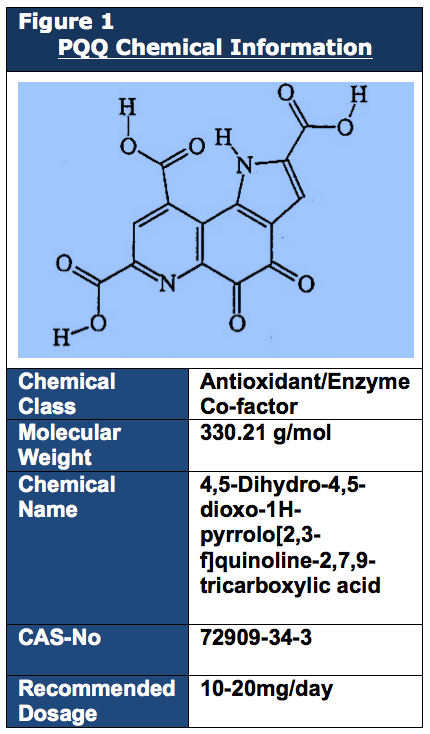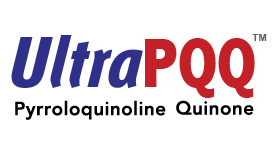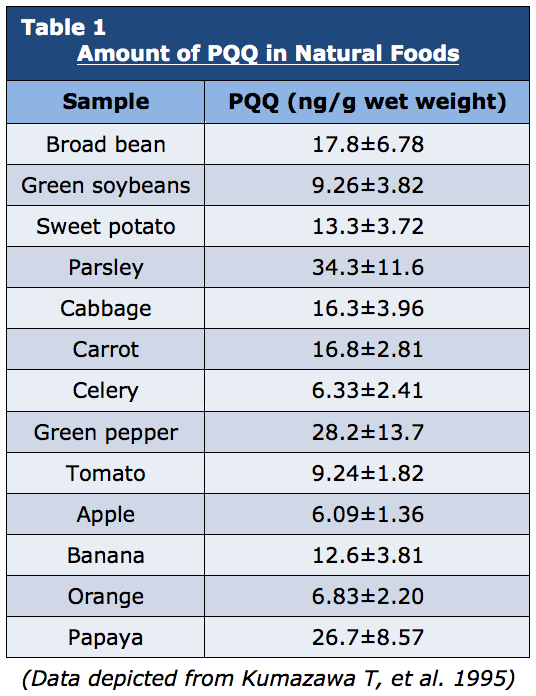 Originally discovered in 1964, pyrroloquinoline quinone (PQQ) was initially described as just a modest cofactor of glucose dehydrogenase1. Since its humble discovery in bacteria, PQQ has been identified as an essential enzymatic cofactor as well as an important antioxidant in a multitude of different systems and species, including humans2-6. PQQ is a natural substance that has shown to be also found naturally in soil, plants, and in the vegetables we eat (Table1)4,7,8. The ubiquity of PQQ and its presence in many natural settings lends to the idea of its fundamental importance in function of everyday life.
Originally discovered in 1964, pyrroloquinoline quinone (PQQ) was initially described as just a modest cofactor of glucose dehydrogenase1. Since its humble discovery in bacteria, PQQ has been identified as an essential enzymatic cofactor as well as an important antioxidant in a multitude of different systems and species, including humans2-6. PQQ is a natural substance that has shown to be also found naturally in soil, plants, and in the vegetables we eat (Table1)4,7,8. The ubiquity of PQQ and its presence in many natural settings lends to the idea of its fundamental importance in function of everyday life.
Sometimes referred to as methoxatin, PQQ plays a vital role as an enzyme cofactor. There are numerous, essential enzymes that require PQQ for their function, and as such, these enzymes are appropriately categorized as quinoproteins. For example, IRE1 is an essential protein that aids in the prevention of toxic accumulation of misfolded proteins. IRE1 relies on PQQ for its proper function in order to maintain healthy homeostasis, and there are numerous other human quinoproteins in which the enzyme activity is highly dependent on PQQ9. Another important quinoprotein aids in neurological health. Dopamine beta-hydroxylase (DBH) helps equilibrate our neurochemicals and maintain chemical balance, and DBH requires presence and binding of PQQ to facilitate proper catalysis10.
In addition to its vital role as a enzyme cofactor, PQQ has also been shown to be a highly effective antioxidants, helping our body to get rid of toxic free radicals that contribute to aging and other related conditions4,11,12.
Through a multitude of mechanisms, PQQ helps maintain and support cardiovascular health, rejuvenates brain function, and gives us more energy to help keep us active and healthy.
Safety
PQQ is a naturally occurring and crucial to human health. PQQ has been previously proposed by scientists to be an effective dietary supplement because our bodies are not able to naturally synthesize it13. Subsequent studies sought to test safety and toxicities associated with PQQ13,14. The recommended daily intake of PQQ is 10-20 mg/day, and researchers found it to be safe even at relatively high dosages well above the recommended dose13,14. The FDA allows for the consumption and use of PQQ as a dietary product in the United States, and it has also been utilized in clinical trials where no adverse side effects were seen6.







